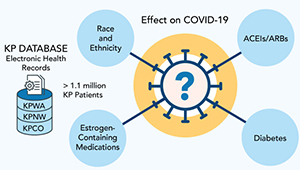Susan Shortreed, PhD
Biography
Susan Shortreed, PhD, uses statistics and machine learning methods to address health science problems, with a special emphasis on analyzing complex longitudinal data. She develops and evaluates statistical approaches for observational data, and works to improve the design and analyses of studies that use data collected from electronic health care records. She is leading a project to develop statistical methods for constructing personalized treatment strategies using data captured from electronic health records.
Dr. Shortreed earned her PhD in statistics from the University of Washington. Then she spent two years in the Department of Epidemiology and Preventive Medicine at Monash University in Melbourne, Australia, and two years in the School of Computer Science at McGill University in Montreal, Canada. Dr. Shortreed has collaborated with scientists in a broad range of areas including alcohol use, cancer screening, and medication safety. She now works alongside researchers in mental and behavioral health, evaluating and comparing treatments for chronic pain and depression, and interventions to prevent suicide. Dr. Shortreed is an investigator with the Mental Health Research Network, designing studies to address important public health concerns, such as determining which antidepressant medications work best for which patients and developing risk prediction algorithms to identify individuals who may be at increased risk for suicidal behavior.
Dr. Shortreed is also an affiliate professor of biostatistics at the University of Washington School of Public Health. She served on the executive board for the American Statistical Association’s Section on Statistics in Epidemiology and the editorial board of the Journal of the Royal Statistical Society, Series C: Applied Statistics.
Research interests and experience
-
Biostatistics
Design and analysis of studies that use data collected from electronic health records; analysis of complex longitudinal data; methods for constructing personalized treatment strategies, computational statistics and algorithms; machine learning; variable selection methods.
Medication Use & Patient Safety
Biostatistics; machine learning; using data collected from electronic health records to study rare adverse events; opioid safety; medication safety in pregnancy.
-
Mental Health
Biostatistics; treatment for chronic depression; suicide prevention; developing personalized treatment strategies; developing risk prediction models.
Recent publications
Thielke SM, Turner JA, Shortreed SM, Saunders K, LeResche L, Campbell CI, Weisner CC, Von Korff MV. Do patient-perceived pros and cons of opioids predict sustained higher-dose use? Clin J Pain. 2014 Feb;30(2):93-101. doi: 10.1097/AJP.0b013e31828e361b. Epub 2013 Mar 26. PubMed
Turner JA, Saunders K, Shortreed SM, Rapp SE, Thielke S, LeResche L, Riddell KM, Von Korff M. Chronic Opioid Therapy Risk Reduction Initiative: impact on urine drug testing rates and results. J Gen Intern Med. 2014 Feb;29(2):305-11. doi: 10.1007/s11606-013-2651-6. Epub 2013 Oct 19. PubMed
McCurry SM, Shortreed SM, Von Korff M, Balderson BH, Baker LD, Rybarczyk BD, Vitiello MV. Who benefits from CBT for insomnia in primary care? Important patient selection and trial design lessons from longitudinal results of the Lifestyles trial. Sleep. 2014 Feb 1;37(2):299-308. doi: 10.5665/sleep.3402. PubMed
Von Korff M, Shortreed SM, Saunders KW, LeResche L, Berlin JA, Stang P, Turner JA. Comparison of back pain prognostic risk stratification item sets. J Pain.2014 Jan;15(1):81-9. doi: 10.1016/j.jpain.2013.09.013. Epub 2013 Oct 4. PubMed
Nelson JC, Shortreed SM, Yu O, Peterson D, Baxter R, Fireman B, Lewis N, McClure D, Weintraub E, Xu S, Jackson LA. Integrating database knowledge and epidemiological design to improve the implementation of data mining methods to evaluate vaccine safety in large healthcare databases. Stat Anal Data Min. 2014;7(5):33751. PubMed
LeResche L, Turner JA, Saunders K, Shortreed SM, Von Korff MR. Psychophysical tests as predictors of back pain chronicity in primary care. J Pain. 2013;14(12):1663-70. doi: 10.1016/j.jpain.2013.08.008. PubMed
Shortreed SM, Bogart A, McClure J. Using multiple imputations to accommodate time-outs in online interventions. J Med Internet Res. 2013 Nov 21;15(11):e252. doi: 10.2196/jmir.2781. PubMed
Vitiello MV, McCurry SM, Shortreed SM, Balderson BH, Baker LD, Keefe FJ, Rybarczyk BD, Von Korff M. Cognitive-behavioral treatment for comorbid insomnia and osteoarthritis pain in primary care: the Lifestyles Randomized Controlled Trial. J Am Geriatr Soc. 2013;61(6):947-56. doi: 10.1111/jgs.12275. Epub 2013 May 27. PubMed
Shortreed SM, Peeters A, Forbes AB. Estimating the effect of long-term physical activity on cardiovascular disease and mortality: evidence from the Framingham Heart Study. Heart. 2013 May;99(9):649-54. doi: 10.1136/heartjnl-2012-303461. Epub 2013 Mar 8. PubMed
Turner JA, Shortreed SM, Saunders KW, Leresche L, Berlin JA, Korff MV. Optimizing prediction of back pain outcomes. Pain. 2013 Aug;154(8):1391-401. doi:10.1016/j.pain.2013.04.029. Epub 2013 Apr 18. PubMed
Research

COVID risks not meaningfully greater with estrogen-containing medications
Oral contraceptives, hormone therapy not linked to more severe COVID outcomes.
Research

A medication that can relieve symptoms of psychosis is underused
Study finds that many patients who might benefit from clozapine don’t receive it.
Research

New findings on treating hypertension in pregnancy
A study led by Dr. Sascha Dublin finds similar outcomes for 3 hypertension medications, filling an evidence gap.
COVID-19

Greater infection risks linked to COVID-19 disparities
New work by Susan Shortreed, PhD, finds infection risks drive worse outcomes for some racial and ethnic groups.
Drugs, diabetes, disparities

Studying COVID-19 risk and outcomes
Dr. Sascha Dublin tells how studies of KP electronic health record data can improve COVID-19 treatment and prevention.
KPWHRI IN THE MEDIA
Simpler models for predicting suicide risk work comparably to more complex ones
Q&A: Simple machine learning model predicts suicide risk well
Healio Psychiatry, April 12, 2023



